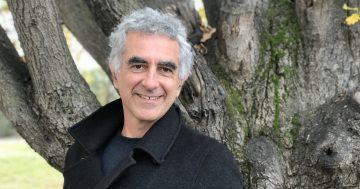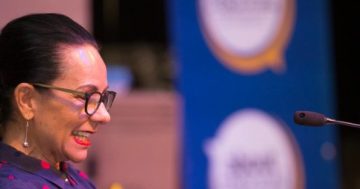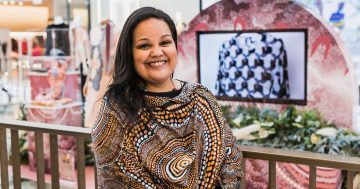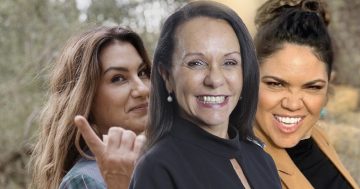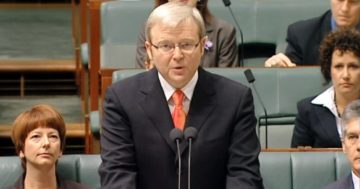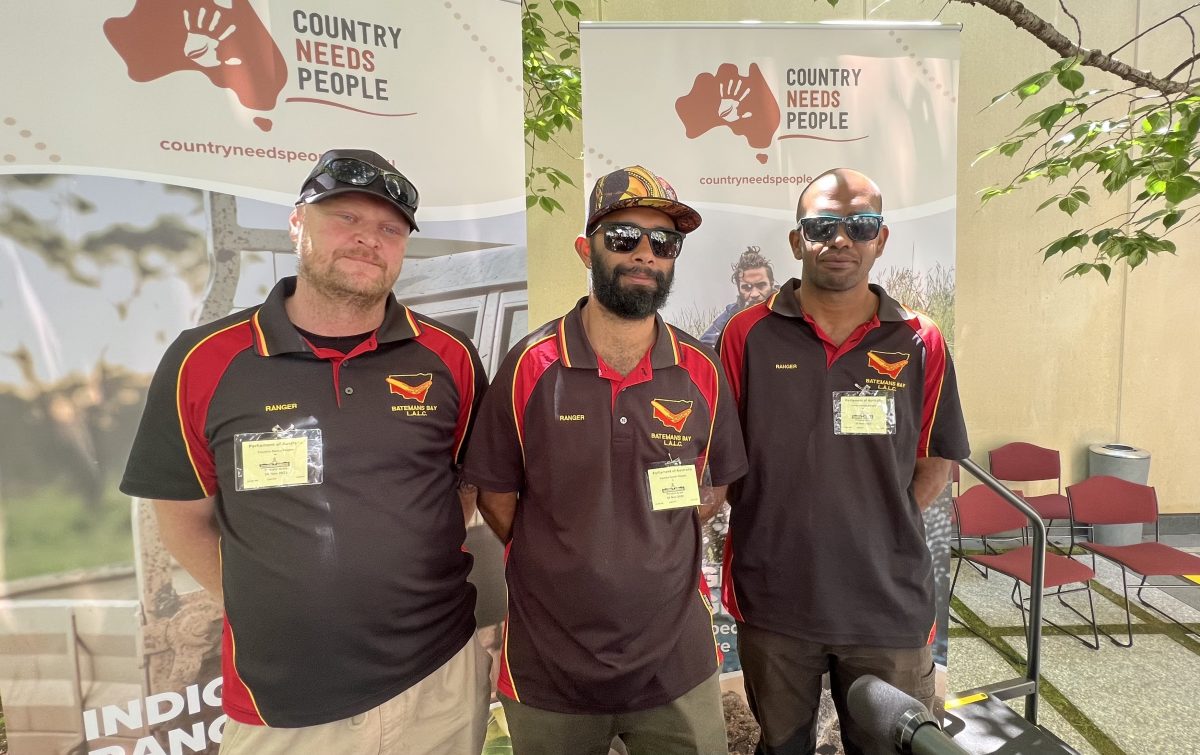
Batemans Bay Walbunja Rangers project coordinator Andrew White, with senior rangers James Thomas and Andrew Stewart, at the Country Needs People event. Photo: Claire Fenwicke.
Indigenous rangers from across the country have congregated in Canberra to celebrate their role in protecting our country’s biodiversity and cultural heritage.
Organised by independent not-for-profit organisation Country Needs People, the Thursday (24 November) event at Parliament House was a chance to network and push for change at a federal level.
Country Needs People CEO Patrick O’Leary stressed that while the program had come a long way, it needed more support to keep going.
“Indigenous Protected Areas [IPAs] are now just over half of all protected areas on land in Australia – that is a world leading figure,” he said.
“We have 125 different ranger groups, and now we have this fantastic commitment to double rangers over the coming years.
“But we know that’s not easy, because all the people here who have committed all their life’s work, in many cases, to their community organisations know what hard work that is.”
He called on the environment department to rebuild support which he said had “dropped off a bit”, to benefit all Australians.
“If there’s a commitment to work together, we can go on to more success,” Mr O’Leary said.
“If you invest in traditional owners and if you support them on Country, they will lead and do the work.”
Country Needs People director Rarrtjiwuy (Melanie) Herdman said the reason they all worked so hard to support their land and sea was simple:
“We know from our elders, and from what we’ve been doing for many years, when we look after Country, Country looks after us.”
Among the attendees were three representatives from the Walbunja Rangers in Batemans Bay, who travelled up to learn more about how they could work and advocate for the growth, security and quality of Indigenous sustainable land and sea management.
They’re one of the younger ranger groups in the country, after receiving funding to fully establish two years ago following the Black Summer bushfires.
Project coordinator Andrew White said that while they had been doing work before that, the money enabled them to employ more people and create new programs for the region.
“We started off cutting the new guys’ teeth with some weed eradication and regeneration work – a lot of cultural burning,” he said.
“Now we do a lot of threatened species and a little bit around our culturally significant areas, as well as knowledge sharing.
“This is a step forward for us, we’re relatively new to this framework, and now that we’re in we’d like to benefit from all this knowledge.”
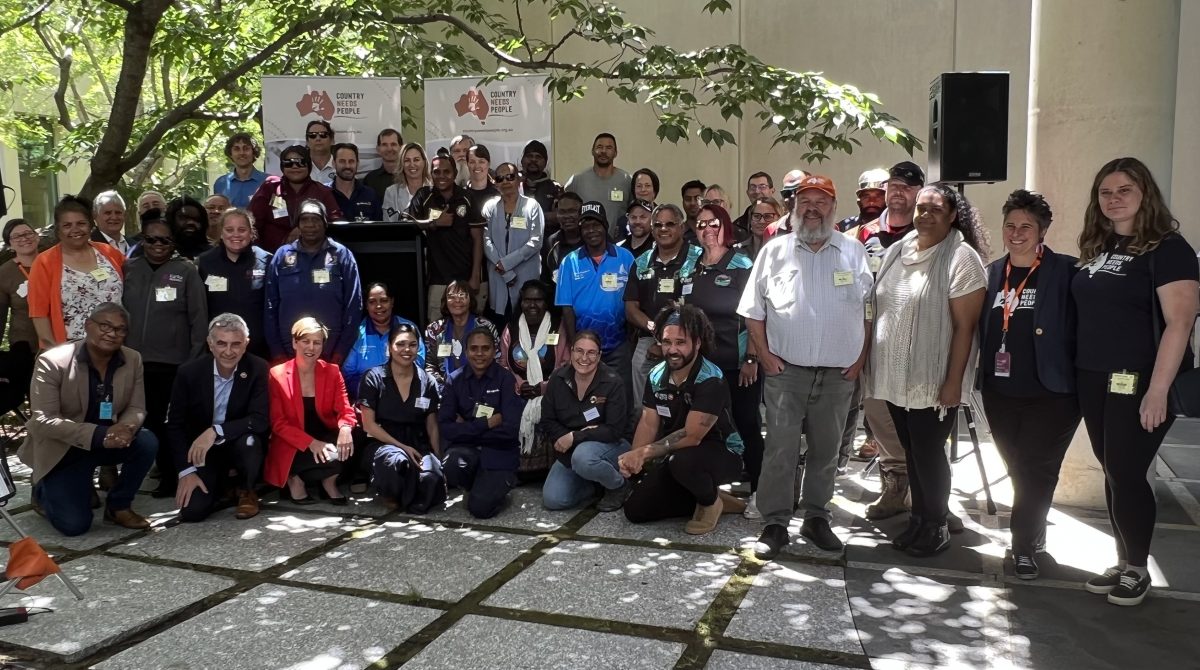
Indigenous rangers came from across Australia for the Country Needs People event at Parliament House. Photo: Claire Fenwicke.
The members engage with local organisations and owners of private land to manage cultural sites and significant sites.
Recently six high schoolers completed Caring for Country traineeships and will join the Walbunja Rangers to assist with Indigenous land management.
Mr White said it created a whole new attitude in those taking part.
“It’s led to a lot of self-determination for these younger kids,” he said.
“We went to our local high school and put some kids through a work experience program, and from then we’ve seen a lot of growth from them.
“A lot of their younger cousins and family members are sort of looking up to them as well, so it’s building that connection and knowledge sharing from the ground level upwards.”
Environment Minister Tanya Plibersek confirmed more investment would be injected into the Indigenous rangers’ Caring for Country program, given how successful they had been in protecting, restoring, preserving and caring for the land.
“We know that Indigenous protected areas that have Indigenous rangers do better for nature,” she said.
“Common sense tells us that having people caring for their own Country is not just good for nature, it’s good for employment, it’s good for culture, it’s good for society – we’ve seen the evidence of that in the Caring for Country program.”
She announced the Government would help to double the number of Indigenous rangers, as well as add 10 new IPAs “in coming years”.
There are 82 IPAs across the country, covering 87.5 million hectares, along with five million hectares of sea country.
Ms Plibersek said this investment was a testament to the work all Indigenous rangers had been doing thus far.
“You have proved that this is good for Country, good for communities, good for nature, good for culture – you have proved that what you do works,” she said.
Indigenous Australians Minister Linda Burney said nothing was more important than the rangers’ work.
“You have a love and want to protect, and make your Country healthy and happy, that’s the beauty of rangers,” she said.
“What you do for our nation is absolutely spectacular.”











